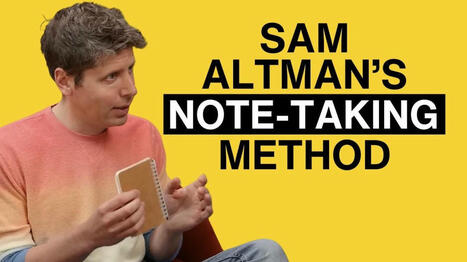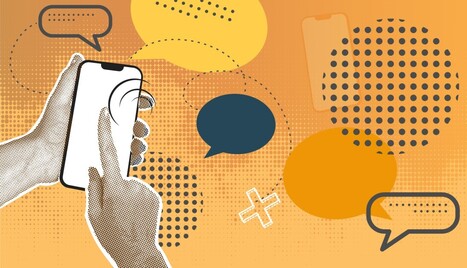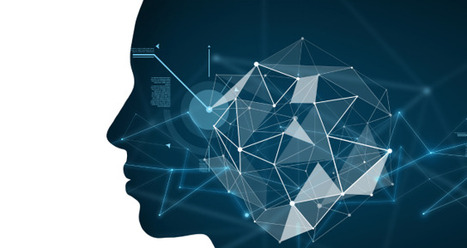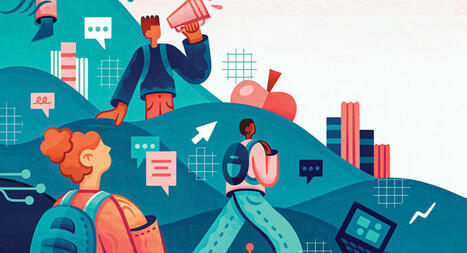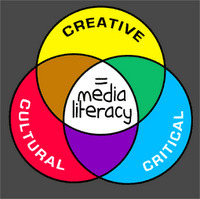Reforming our schools will start with a new understanding of purpose, borrowed from the first opponents of the Department of Education.
Get Started for FREE
Sign up with Facebook Sign up with X
I don't have a Facebook or a X account


 Your new post is loading... Your new post is loading...
 Your new post is loading... Your new post is loading...
It’s been two years since ChatGTP made its public debut, and in no sector has its impact been more dramatic and detrimental than in education. Increasingly, homework and exam writing are being done by generative AI instead of students, turned in and passed off as authentic work for grades, credit, and degrees. It is a serious problem that devalues the high school diploma and college degree. It is also sending an untold number of supposedly qualified people into careers and positions such as nurses, engineers, and firefighters, where their lack of actual learning could have dramatic and dangerous consequences. Via Edumorfosis 
Edumorfosis's curator insight,
December 1, 2024 2:33 PM
Invertir dinero en herramientas para detectar si los trabajos entregados por los estudiantes fueron hechos con los modelos de la IA, es una pérdida de tiempo. En cambio, desarrollemos nuevos instrumentos evaluativos para detectar el desarrollo cognitivo y las conexiones mentales de nuestros estudiantes. Enfoquémonos más en su APRENDIZAJE y menos en la trampa...
The campus officials who enforce conduct codes are navigating a deluge of demands from students, institutional leaders, advocacy groups, and politicians — including President-elect Trump.
Dennis Swender's insight:
Free email signup with The Chronicle of Higher Education
Thomas Sowell (born June 30, 1930) is an American author, economist, and political commentator who is a senior fellow at the Hoover Institution at Stanford University. Sowell is the author of more than 45 books (including revised and new editions) on a variety of subjects including politics, economics, education and race, and he has been a syndicated columnist in more than 150 newspapers.
AI has significant untapped potential within higher education, particularly as institutions fail to adopt the technology. Via EDTECH@UTRGV, michel verstrepen, juandoming 
EDTECH@UTRGV's curator insight,
November 29, 2024 1:12 PM
"As universities look for ways to increase enrollment and student retention as they boost revenue growth, many higher-education administrators believe AI is the key."
Unlock productivity with Sam Altman’s adaptable note-taking method, blending analog tools and digital platforms for better idea management.
"The discussion around the addition of digital literacy development into curriculum design has moved aside, being replaced by assumptions around the ability of students to complete digital tasks. Specific digital development has been shown in some subjects, such as in pharmacy education [1], but there are still a vast number of digital skills and capabilities that are required to be successful and have a good experience as an undergraduate university student and to also be a successful member of a digital society in the working world." Via EDTECH@UTRGV 
EDTECH@UTRGV's curator insight,
November 25, 2024 10:35 AM
"If students are to truly develop their digital literacy within higher education, the mapping of skills required for academic study and their future careers needs to be explicit..., rather than leaving self-development up to the student to explore."
Microcredentials are reshaping the future of higher education, but barriers remain for most higher ed institutions. Via EDTECH@UTRGV 
EDTECH@UTRGV's curator insight,
November 20, 2024 3:19 PM
"As microcredentials expand, so do workforce opportunities for students"
We cannot ignore the powerful relationship between students and their phones—and what they mean for equity in our most challenged schools. Via EDTECH@UTRGV 
EDTECH@UTRGV's curator insight,
November 21, 2024 10:13 AM
"To help students catch up, we should be leaning into technology" 
Cristina S.'s curator insight,
November 21, 2024 4:20 PM
Creo que esta relación estudiante-teléfono es una realidad que los educadores deben abordar de manera proactiva, buscando formas de integrar estos dispositivos en el aprendizaje de manera constructiva, especialmente en entornos educativos con recursos limitados. La clave está en aprovechar su potencial mientras se mitigan los posibles efectos negativos.
The following interview is with David Collis, business administration professor at the Harvard University Business School. In 1999, Collis wrote about the changing winds in the higher education industry, and discussed the substitutes that existed in the space institutions would be competing against in the early 2000s. In this interview, Collis reflects on the most […]
"Acknowledging both the importance of writing and the challenges it presents, we recently introduced an innovative activity in our Intermediate Spanish class. In Spring 2024, we implemented an AI-powered writing exercise using ChatGPT, designed to make writing more approachable and less intimidating for students. We tasked students with engaging in a written conversation with an AI, specifically designed to simulate natural dialogue. Our hope was that by eliminating the pressure of activities subject to formal evaluation, students would feel more comfortable experimenting with the language. This would allow them to focus on expanding their vocabulary and refining sentence structure in a low-stakes, stress-free environment." Via EDTECH@UTRGV 
EDTECH@UTRGV's curator insight,
November 13, 2024 12:43 PM
"While not without its challenges, the integration of AI into writing exercises demonstrated promise as a tool for helping intermediate Spanish students practice and enhance their language skills in multimodal settings."
Universities are still coming to terms with hybrid approaches to learning and the rise of AI. What does this mean for how we measure the quality of learning? Via EDTECH@UTRGV 
EDTECH@UTRGV's curator insight,
November 14, 2024 9:24 AM
"The rise of generative AI has added another layer of complexity to discussions around the quality of online learning."
"It’s time to shake things up in education, and edtech can disrupt traditional learning at every level, from early childhood to university level instruction. We’ve been saying that for years, so how much disruption has edtech created? More than nifty gadgets and tools The first place to look for innovative disruption is in classrooms harboring the latest tech devices. Tablets, interactive robots, and digital voice assistants make up part of the edtech landscape. So do VR goggles, 3D printers, and a host of educational software and apps." Via EDTECH@UTRGV, Jaime Guerra |
A conservative-led effort is rolling back diversity, equity, and inclusion policies following a DEI wave after the murder of George Floyd in 2020.
"Instead of focusing on “dos and don’ts,” digital citizenship must help students explore complex questions ..." Via Leona Ungerer
Sam Altman recommended some pens. He’s right that you should take notes by hand. But I’m not so sure about the tools he’s using.
Discover effective strategies for assessing online learners and making meaningful changes to enhance skill development. Via EDTECH@UTRGV 
EDTECH@UTRGV's curator insight,
November 21, 2024 10:07 AM
"The problem with traditional assessments is that they're mostly all about right or wrong answers and even have time limits. This doesn't align with the online learning experience, where students might be learning at different paces, in various time zones, and while having their own responsibilities (full-time jobs, kids, hobbies, personal lives)."

Ana Cristina Pratas's curator insight,
July 17, 2024 7:21 AM
"Four ways to hit the reset button and inspire students to read course texts."
johnson's curator insight,
August 18, 2024 11:45 PM
https://epicpainmeds.com/product/buy-adderall-xr-online/ https://epicpainmeds.com/product/buy-ambien-10mg-zolpidem-online/ https://epicpainmeds.com/product/buy-amoxicillin-capsule-online/ https://epicpainmeds.com/product/buy-anavar-online/ https://epicpainmeds.com/product/buy-ativan-lorazepam-online/ https://epicpainmeds.com/product/buy-cialis-online/ https://epicpainmeds.com/product/buy-co-codamol-online/ https://epicpainmeds.com/product/buy-co-dydramol-online/ https://epicpainmeds.com/product/buy-codeine-online/ https://epicpainmeds.com/product/buy-concerta-online/ https://epicpainmeds.com/product/buy-darvocet-online/ https://epicpainmeds.com/product/buy-demerol-online/ https://epicpainmeds.com/product/buy-dexedrine-online/ https://epicpainmeds.com/product/buy-diazepam-injection-online/ https://epicpainmeds.com/product/buy-diazepam-online-2/ https://epicpainmeds.com/product/buy-dihydrocodeine-online-2/ https://epicpainmeds.com/product/buy-dilaudid-online/ https://epicpainmeds.com/product/buy-fentanyl-online/ https://epicpainmeds.com/product/buy-galenika-bensedin/ https://epicpainmeds.com/product/buy-hydrocodone-online/ https://epicpainmeds.com/product/buy-ketamine-online-2/ https://epicpainmeds.com/product/buy-morphine-sulfate-online/ https://epicpainmeds.com/product/buy-opana-oxymorphone-online/ https://epicpainmeds.com/product/buy-oramorph-oral-sollution/ https://epicpainmeds.com/product/buy-oxycodone-online/ https://epicpainmeds.com/product/buy-pregabalin-online/ https://epicpainmeds.com/product/buy-rivotril-clonazepam-online/ https://epicpainmeds.com/product/buy-suboxone-online/ https://epicpainmeds.com/product/buy-temazepam-online/ https://epicpainmeds.com/product/buy-valium-online/ https://epicpainmeds.com/product/buy-vyvanse-online/ https://epicpainmeds.com/product/buy-xanax-online/ https://epicpainmeds.com/product/buy-zopiclone-online/ https://epicpainmeds.com/product/caluanie-muelear-oxidize/ https://epicpainmeds.com/product/keto-bullet/ https://epicpainmeds.com/product/matcha-slim/ https://epicpainmeds.com/product/promethazine-cough-syrup/ https://epicpainmeds.com/product/rhino-gold-gel/ https://epicpainmeds.com/product/simpla-360/ https://alphamedspharma.com/product/buy-adderall-xr-online/ https://alphamedspharma.com/product/buy-ambien-10mg-zolpidem-online/ https://alphamedspharma.com/product/buy-amoxicillin-capsule-online/ https://alphamedspharma.com/product/buy-anavar-online/ https://alphamedspharma.com/product/buy-ativan-lorazepam-online/ https://alphamedspharma.com/product/buy-cialis-online/ https://alphamedspharma.com/product/buy-co-codamol-online/ https://alphamedspharma.com/product/buy-co-dydramol-online/ https://alphamedspharma.com/product/buy-codeine-online/ https://alphamedspharma.com/product/buy-concerta-online/ https://alphamedspharma.com/product/buy-darvocet-online/ https://alphamedspharma.com/product/buy-demerol-online/ https://alphamedspharma.com/product/buy-dexedrine-online/ https://alphamedspharma.com/product/buy-diazepam-injection-online/ https://alphamedspharma.com/product/buy-diazepam-online-2/ https://alphamedspharma.com/product/buy-dihydrocodeine-online-2/ https://alphamedspharma.com/product/buy-dilaudid-online/ https://alphamedspharma.com/product/buy-fentanyl-online/ https://alphamedspharma.com/product/buy-galenika-bensedin/ https://alphamedspharma.com/product/buy-hydrocodone-online/ https://alphamedspharma.com/product/buy-ketamine-online-2/ https://alphamedspharma.com/product/buy-morphine-sulfate-online/ https://alphamedspharma.com/product/buy-opana-oxymorphone-online/ https://alphamedspharma.com/product/buy-oramorph-oral-sollution/ https://alphamedspharma.com/product/buy-oxycodone-online/ https://alphamedspharma.com/product/buy-pregabalin-online/ https://alphamedspharma.com/product/buy-rivotril-clonazepam-online/ https://alphamedspharma.com/product/buy-suboxone-online/ https://alphamedspharma.com/product/buy-temazepam-online/ https://alphamedspharma.com/product/buy-valium-online/ https://alphamedspharma.com/product/buy-vyvanse-online/ https://alphamedspharma.com/product/buy-xanax-online/ https://alphamedspharma.com/product/buy-zopiclone-online/ https://alphamedspharma.com/product/caluanie-muelear-oxidize/ https://alphamedspharma.com/product/keto-bullet/ https://alphamedspharma.com/product/matcha-slim/ https://alphamedspharma.com/product/promethazine-cough-syrup/ https://alphamedspharma.com/product/rhino-gold-gel/ https://alphamedspharma.com/product/simpla-360/ https://goethe-zertifikat.com.de/telc-zertifikat/ https://goethe-zertifikat.com.de/osd-zertifikat/ https://goethe-zertifikat.com.de/testdaf-zertifikat/ https://goethe-zertifikat.com.de/goethe-zertifikat-b1/
It is high time legislators made those who allow the peddling of this modern misery pay for their role. Via Peter Mellow
Schools’ efforts to restrict cellphone use have set up a battle of wits between teachers and students. Via EDTECH@UTRGV 
EDTECH@UTRGV's curator insight,
November 12, 2024 9:32 AM
"Schools’ efforts to stop students from using their cellphones during class have set up a battle of wits between teachers and their charges."
"Mary Nestor, Millie Tullis and James Butler write that a recent opinion essay presented a distorted view of the possibilities of asynchronous course design." Via EDTECH@UTRGV 
EDTECH@UTRGV's curator insight,
November 13, 2024 12:59 PM
"Robert Zaretsky’s recent opinion piece bemoaning the increase of asynchronous online courses paints a distorted picture of online education—both asynchronous and synchronous—as it should and often does exist today."
With microcredentials becoming an increasingly popular offering in higher education, it’s critical that institutions ensure quality. Via EDTECH@UTRGV 
EDTECH@UTRGV's curator insight,
November 14, 2024 9:46 AM
"There is still debate across the national landscape about what microcredentials are genuinely meant to capture. Some view them as recognition for smaller, specialized learning achievements that supplement traditional degrees. In contrast, others like myself go even further and contend that microcredentials highlight the most nimble, niche competencies learners acquire throughout their journey." |




![[Study] 94% of AI-Generated college writing is undetected by teachers | ED 262 KCKCC Fa '25 | Scoop.it](https://img.scoop.it/Gv3u-KXZHV4rL8QXue6Cbzl72eJkfbmt4t8yenImKBVvK0kTmF0xjctABnaLJIm9)


